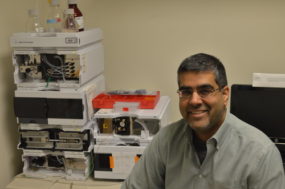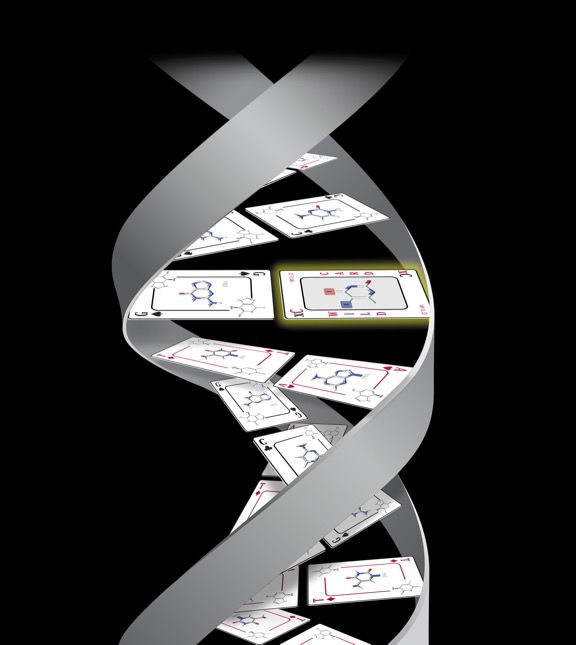
Stories
Rahul Kohli – Physician Scientist: Exploring the Genome Changes to Inform Medicine

“When I was a kid, it was math that always really fascinated me—I loved logic games. Sitting around doing puzzles with my dad or math questions, that got me going in that direction of problem solving,” remembers Rahul Kohli.
As a high school student, Kohli began to see connections between his STEM classes—chemistry, biology, and math; specifically—and his interest in problem solving and logic puzzles as foundational aspects of research. Kohli explains, “It was just about how to ask and answer questions and find a logical way to construct an argument. That aspect of chemistry and biochemistry was appealing to me, with the added benefit that I could see the translational impacts of what research could be.”
During his junior year of high school, Kohli had his first opportunity to apply what he had learned in the classroom to real world research. During a summer program at MIT, he completed mathematics research with a professor who studied the field of number theory. Just before the end of the summer, Kohli had a personally groundbreaking experience with the research questions he was trying to address. At a meeting with his research mentor, Kohli described with great excitement the new proof he had just solved. His research mentor congratulated him on his work, and then pulled a book down from the bookshelf. After flipping through some pages, he pointed out the exact theorem Kohli had just described and a related proof.
While a little deflated that his intellectual triumph turned out to be common knowledge, Kohli’s research mentor took the time to explain why there was still reason for celebration. He explained to Kohli how rediscovering things already discovered was essentially the grounding for the scientific method.
“He made the point that that is science. We’re uncovering knowledge about how the world works. That knowledge exists. We uncover it. It’s not like we’re reinventing it or coming up with totally new knowledge. Our part is to uncover it, not to discover it, which is a subtle difference,” says Kohli.
This lesson stayed with Kohli as he continued in his education past high school. He went on to complete his undergraduate degree at the University of Michigan, majoring in biochemistry. Afterward, he received his M.D./Ph.D. from Harvard Medical School, studying biochemistry and molecular pharmacology. At Harvard, ideas and connections started to fuse together. He knew where he wanted to take his work as an independent researcher.
“I realized that there was a real opportunity to apply my training in enzymology to understand the enzymes that are involved in actually catalyzing these genomic changes. So, both the biochemistry and the chemical biology parts of me really came together in thinking about these questions.”
“My graduate work focused on enzyme mechanisms and fundamental biochemistry. I studied the pathways that lower organisms use to make really complex natural products, including antibiotics and other kinds of antimicrobials, with a series of enzymes,” recalls Kohli.
Looking back on his early training in medicine and then in infectious diseases, Kohli shares, “I was thinking hard about the questions where my background and training in enzymology, or enzyme mechanisms, could make an impact in the field of infectious diseases. These reflections were happening at a time when genomic information was becoming more prevalent, which brought me to this question of not just what is the genomic information that’s out there, but how does that information change? Because that’s really at the heart of the battle between infectious pathogens and the host. We have to have this ability in our adaptive immune system to reprogram our B-cells and T-cells to be able to recognize all the variegated features of pathogens. On the flipside, pathogens have to be able to escape from immune pressures or antimicrobials. So that idea of how genomes are dynamic, how they change, is a question that really came out of my clinical grounding in infectious diseases.”
Both the biochemistry and the chemical biology aspects of his training really came together in thinking about these questions. Kohli explains, “I realized that there was a real opportunity to apply my training in enzymology to understand the enzymes that are involved in actually catalyzing these genomic changes.”
After completing his postdoctoral fellowship at Johns Hopkins University with James T. Stivers in pharmacology and molecular sciences, he joined the University of Pennsylvania as an assistant professor in 2010 and set up the early stages of the Kohli Lab, which primarily focuses on understanding DNA modifying enzymes and the complexity of the genome, as well as how pathogen pathways promote evolution and antibiotic resistance.
“The first five or so years in my lab, the time that was supported by the Rita Allen grant, was a period when my lab was focused on understanding how these DNA modifying enzymes worked. Trying to understand their biology, their implications for pathology, and disease. With that understanding, at some point, we had the realization that we understood them well enough that we potentially turn them into new biotechnological tools. Now, over these last five years, a good part of my lab focused on leveraging DNA modifying processes to engineer genomes with targeted changes; or using the enzyme’s nature has offered new engineered versions in all enzymatic pipelines that can allow us to ‘read’ the epigenome, decoding epigenetic DNA modifications on samples that have very small amounts of DNA. The lab has sort of had this trajectory of moving from understanding biology to applying it in these new biotechnological realms,” explains Kohli. His lab takes advantage of the natural properties of DNA modifying enzymes to develop techniques for decoding epigenetic DNA modifications or chemical compound tags that modify DNA and regulate gene expression.
Currently, Kohli is a tenured associate professor of medicine and an associate professor of biochemistry and biophysics at the University of Pennsylvania School of Medicine. Here, he discusses the impact of the Rita Allen Award, challenges in research, and achievements in his career.
What has been the impact of the Rita Allen Award on your research and career trajectory?
I think that the support was something that really allowed us to delve into a totally new area. Without this specific award, my lab would be doing the pathogen-related work we do, the immunity-related work we do, but I would not have opened up into new areas of epigenetics. I put our ideas in this area into the proposal and suggested that it was an adventurous area I wanted to head into. For the early years, that adventure and that project were entirely supported by [the Rita Allen Award]. It now forms a core of a lot of what the lab does.
What have been some of the challenges that you’ve experienced in your research and how have you addressed those challenges?
One of the challenges has been maintaining a breadth of knowledge to be able to have your research impact many different areas. With our focus on DNA modifying enzymes, we have, I think, something to offer in several different arenas—antimicrobial resistance, immunity, and epigenetics. We clearly could have picked one area focused on just that, and really dove just into that, but I think it would have limited the impact of some of the things that we’re doing. So, I think that has been one of my biggest challenges: making sure that we find ways to contribute to fields that are all kind of massive in and of themselves but have pieces that tie back to the kind of core interests of the lab.
What is at least one significant research achievement that has come out of your work to date?
The one that I want to highlight, in part because it builds on the Rita Allen Award, would be the developments that we made in taking this toolkit that nature has for DNA modifying enzymes and moving them into the realm of sequencing of DNA modifications themselves. So, that idea that we’re using the enzymes that nature has to modify DNA to now read DNA is, I think, something that our lab really pioneered and is making an impact. There’s been a movement in the field away from chemical approaches to decoding DNA modifications towards these enzyme-based approaches, and our lab was the first to develop an all-enzymatic approach to decoding specific DNA modifications.
We realized nature gives us these tools that work under normal conditions and normal pH; they’re non-destructive. So, the sequencing pipelines that we’ve developed exploit all those features of what nature has to offer. Beyond that, we’ve engineered these enzymes to take on functions that don’t exist in nature. By mixing and matching those enzymes, we can read the full suites of different DNA modifications. We can read how much of a modification there is and where they are in specific places in the genome. The development of these sequencing technologies is grounded in a fundamental understanding of the chemical biology and the biochemistry of those DNA modifying enzymes, which were insights that we gained in those early years without ever having this vision of how we would apply it at that time.
